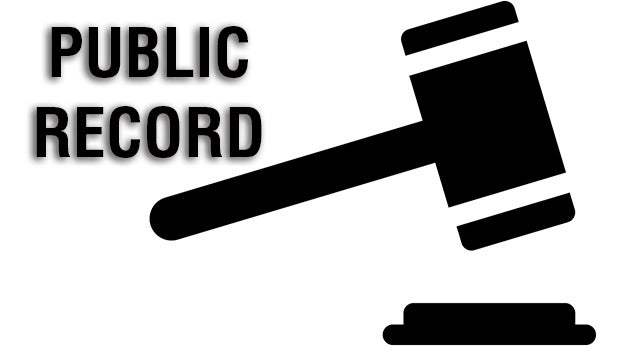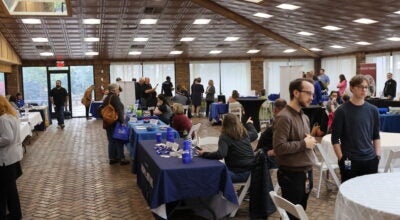Kentucky students may need more ‘unsung heroes’
Published 7:28 pm Friday, February 1, 2019
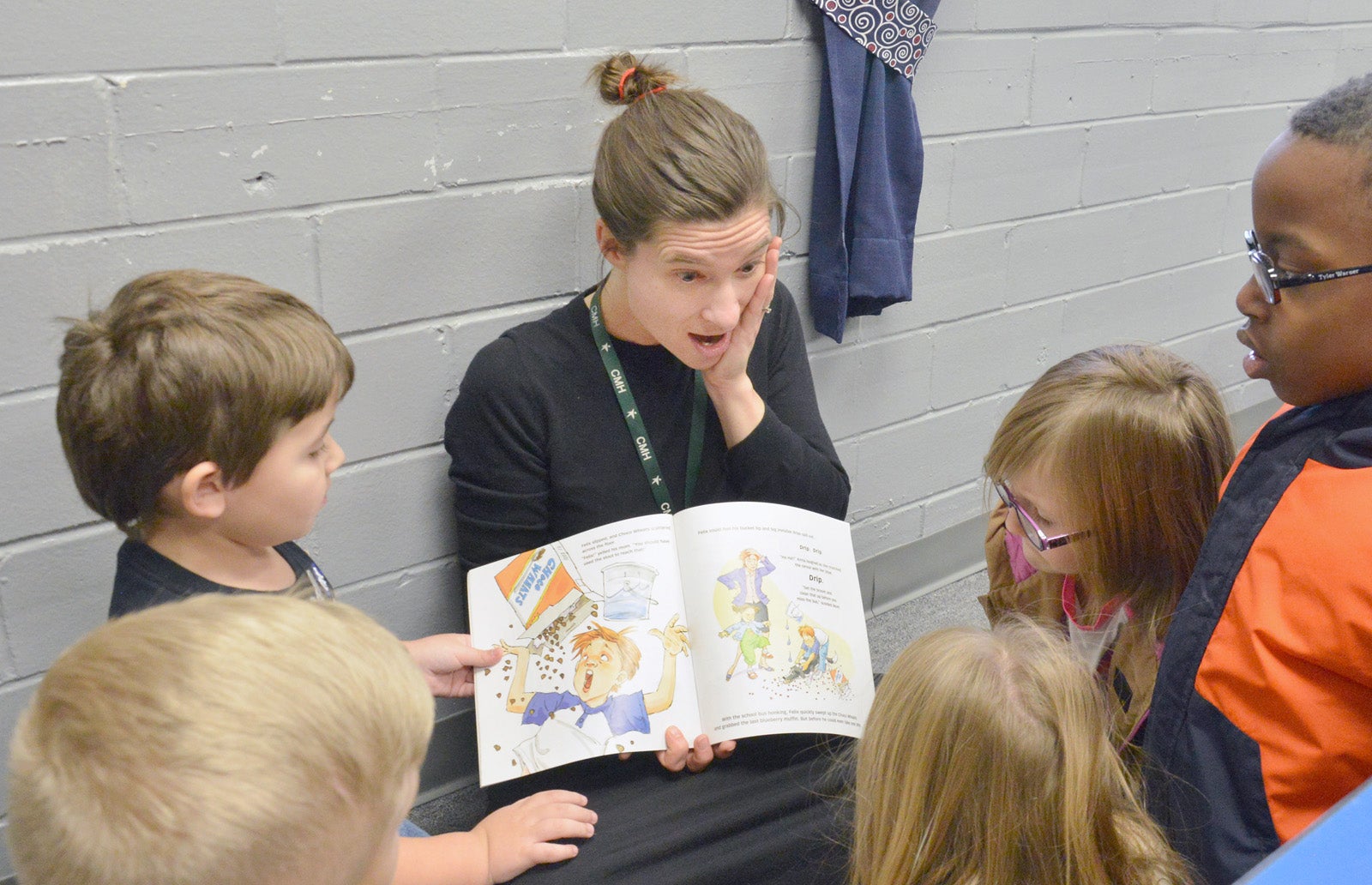
- Photos by Robin Hart Mary G. Hogsett Primary School counselor Sarah Rankn reads the book "Have You Filled A Bucket Today?" to a group of students. The story is about imaginary buckets that everyone has which holds good thoughts and happy feelings.
Boyle County Middle School counselor Sharon Todd can’t help but begin to cry as she looks over the stack of purple cards in front of her.
The cards are written by students and delivered to her; they list problems the students are having, things they need her help with.
“This is real life stuff,” she says. If something is important to “that kid at that moment, and it has rocked their world that day, we’d better address it.”
An increasing number of young students are dealing with social and emotional issues while still trying to learn academic lessons at school.
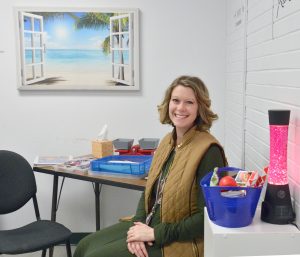
Photos by Robin Hart
Boyle County Middle School counselor Sharon Todd welcomes small groups of students and individuals into her office whe she’s working with them to resolve an emotional or social issue.
“Unfortunately, the problems facing students today are vast and extreme,” said Mercer County Intermediate School counselor and Kentucky School Counselor Association Advocacy Chair Amy Riley. “On a daily basis, I see students who are facing poverty, eviction, parents in jail, parents with addictions, suicide thoughts, self mutilation and abuse. And I work with 8- to 10-year-olds.”
“At a time when school safety is at the forefront of most political conversations, school counselors are the unsung heroes on the front lines in public schools, often times the first to hear threats and start the process of keeping students safe,” Riley said. “School counselors service all students in their schools and deal with problems ranging from suicide threats to teen pregnancy, child abuse to incarcerated parents.”
Todd said because of confidentiality, the public often isn’t able to know about the positive impact school counselors have on students lives.
“It’s behind the scenes work. Many times we are the first people to hear information that could save someone’s life, and that’s priceless.”
Todd said school counselors are vitally important for the academic success of students, especially those who are experiencing negative events in their lives.
Negative impacts on young lives include friendship disputes and spending too much time on their devices overnight, playing games and using social media. But it also includes divorce, parental drug and alcohol addiction, a parent’s drug overdose or parents who are in jail, Todd said.
It’s hard for a child trying to learn math, “when they’re worried about Dad’s court date,” she said.
Too many problems
Children today face a near-constant barrage of “negative messages” from places like social media or some video games, which contributes to their mental health problems, Riley said.
“Across the board, students do not feel pretty enough, smart enough, or good enough,” she said. “This has led to increased rates of suicidal threats and attempts and school counselors are often the first to hear these concerns.”
Social media has also made it easier for adults “who do not have the child’s best interest in mind” to prey upon kids, she added.
How do counselors help? One success story that Riley recalls is from several years ago: A fifth-grader had been held back was failing in every class. A school counselor met with the boy for several months and eventually gained his trust. That’s when the child revealed that he had an abusive father at home.
The counselor continued working with the boy and he soon took an interest in school and his grades. The teacher lost track of the student, but several years later, the young man walked up to his former school counselor and thanked her for her encouragement.
“He thanked her and said that if she hadn’t invested in him, he would not have graduated,” Riley said. “He needed someone to work one-on-one with him outside of the normal classroom experience in order for him to build his confidence and begin to succeed.”
Just this year, a student wrote a note to a school counselor reporting that another student had a weapon at school.
“Because the child trusted the counselor, the counselor was able to quickly notify law enforcement, check the child for a weapon and keep the school safe,” Riley said. “This happens pretty regularly. When students have someone they can trust at school, they will often disclose things that are dangerous.”
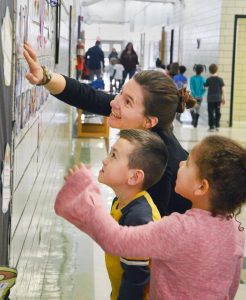
Photos by Robin Hart
Rankin shows Jalynn Green, center, and Arianna Cruver their photos on the “Bucket filler of the week” display. A “bucket filler” is someone who shows kindness to others, Rankin explained.
Not enough counselors
“Sadly, school counselors are not mandated in Kentucky — librarians are, but we aren’t,” Riley said. “There are currently 340 schools in Kentucky without a counselor. And, for those who do have a counselor on staff, they are often way above the American School Counselor Association recommendation of a student-to-counselor ratio of 250-to-1.”
That means students often don’t have access to all the services they might need, services that school counselors are trained to provide.
“It is tragic that we live in a time when the answer to school violence seems to be to bring in more outside resources into the school, when there are highly trained individuals already there, who would love to be able to do what they were trained to do and provide a comprehensive counseling program to every child in Kentucky,” she said. “School counselors, have a relationship with every child in the school and have built a culture of trust.”
Kentucky’s Senate Bill 1, a top priority for passage this session, attempts to address students needs, but may fall short in the area of providing counselors.
“The legislation calls for school districts to hire more school resource officers and mental health counselors as funding becomes available,” Todd said. “However, ‘school counselors’ are not even mentioned in the list of ‘mental health’ providers. With all of the stressors and challenges our students face, they deserve school counselors who are available to address concerns with them and develop plans to help them move forward.”
Who are school counselors?
What some people still refer to as “guidance counselors” are what they remember as being people who scheduled classes in middle school and guided high school students onto paths for careers and college.
But “school counselors are no longer the guidance counselors of 20 years ago,” Riley said. “They are highly educated mental health professionals who run comprehensive counseling programs that include small groups, individual counseling and whole classroom counseling services.”
School counselors often serve as the link between students and the help students need.
“Elementary- and middle-school students are at a critical age to learn social emotional skills that are only taught by school counselors,” Riley said. “This is vital for young children who are just learning how to interact with others.”
Counselors help students and their families “reduce barriers to learning” by referring them to a family resource center’s food program or a mental health therapist, for example, she said.
“Sadly, school counselors are usually the ones who first hear of abuse, and threats and serve as mandated reporters to help get families the help and services they need,” Riley said. “Yes, career guidance is still a vital part of the school counselor’s responsibility, but it is no longer the central focus. School counselors focus on the emotional well-being of the whole child, and not just their future after leaving us.”
Hogsett on Main Primary School counselor Sarah Rankin works with pre-kindergarten through first-grade students. She said having a school counselor available for such young children is important because “it’s a formative time in their life.”
“It starts when they are very young,” she said.
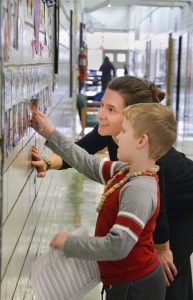
Photos by Robin Hart
Ellis Anderson places of photo of himself as a “Bucket filler of the week” as Hogsett Primary School counselor Sarah Rankin watches.
By teaching children coping skills, breathing techniques, self control and the importance of kindness, it will give them life-long tools they can use in their academic and personal lives, tools that let them focus on what’s important, she said.
Programs at the elementary level include the current “Bucket filler” initiative at Hogsett. Rankin went to every classroom and read the book, “Have You Filled Your Bucket Today?” which promotes kindness to each other.
Students use an imaginary bucket to hold good thoughts and feelings, she explained. When a student is seen or heard being kind to another student, then they are a “bucket filler.”
The importance of kindness to others is very important to Rankin: “It implements social and emotional learning.”
Elementary-school counselors usually work with entire classrooms, leading lessons on kindness or how to deal with self-control and emotions; middle school counselors tend to focus on students in small-group settings and help to teach resilience to life problems and how to be good friends, Riley said.
“But all counselors uniquely meet the needs of students on any given day,” she said. “You never know what you might be finding a school counselor doing. It could be anything from enrolling a new student, comforting a child who just lost a family member, leading a class lesson on respect, doing a home visit for a child who is truant or calling a parent about a child’s academic concerns.”



